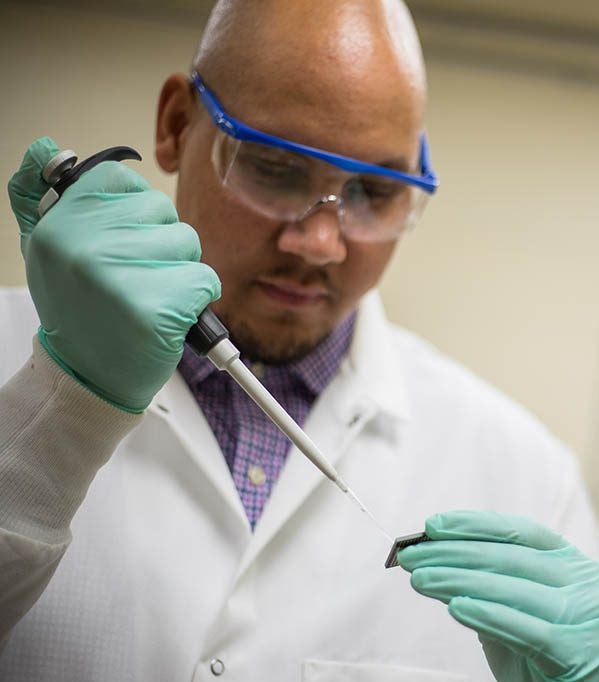Library account covers publication costs for researchers
East Carolina University Academic Library Services has set up an account to pay publication costs for articles in several Public Library of Science (PLOS) journals.
The PLOS account is one of several agreements the libraries have entered into with publishers allowing ECU authors to publish in their journals at reduced or no cost to the ECU author.
“Academic Library Services is committed to making research more sustainable, affordable, transparent and open,” said Janice S. Lewis, ALS director. “One of the ways we do this is by paying all or part of the costs for ECU authors to publish in peer-reviewed journals that make their articles open to all readers.”

Keith Keene, associate professor of biology and director of the Brody School of Medicine Center for Health Disparities, was the first faculty member to use a new account set up by ECU Academic Library Services to pay publication costs for certain journal articles. (Photo by Cliff Hollis)
The first faculty member to use the account was Dr. Keith Keene, associate professor of biology and director of the Brody School of Medicine Center for Health Disparities. His article, co-authored with other ECU faculty and researchers at other institutions, is titled “DNA methylation analyses identify an intronic ZDHHC6 locus associated with time to recurrent stroke in the Vitamin Intervention for Stroke Prevention clinical trial.”
“We are thrilled that Dr. Keene and his colleagues chose to publish in PLOS ONE, a well-respected, high impact open journal, and that we were able to help fund its publication,” Lewis said. “It is appropriate that the topic is on intervention for stroke prevention. Stroke is a leading cause of death in the United States, and residents of eastern North Carolina are at higher risk of stroke than the national average. According to the authors, the findings for this study lay the foundation for further studies investigating these outcomes in diverse populations.
“Another reason it is important is that their study results were published in an open access journal and are immediately available to researchers everywhere.”
Faculty contantly feel pressure to “publish or perish,” Keene said, and budget cuts have become more prevalent even as publication costs have increased.
“As a part of our university mission, we must be good stewards of the resources entrusted to us. Programs such as the Academic Library Services’ open access publishing support are critical to achieving our university research mission while also being fiscally responsible,” Keene said. “This program helps alleviate some of the barriers to academic success (such as publication costs), promotes research productivity of our faculty and allows for a greater diversity of scholarly activities.”
A second article by several librarians at Laupus Library has also been published using the PLOS account. The article investigates the effect of librarian involvement on the quality of systematic reviews in dental medicine.
Lewis said the library budgeted funds for the account to support research and learning at the university. It benefits authors who are publishing so that they don’t have to generate the funds to publish, as well as supporting open access to scholarship.
“If more universities do this it opens up scholarship for everyone,” she said. “We want ECU to continue to be more active in this effort.”